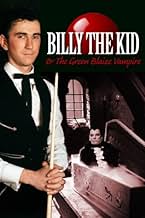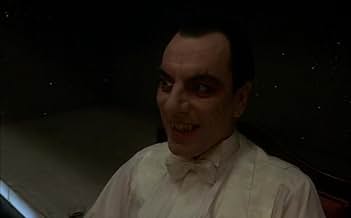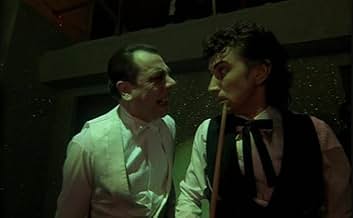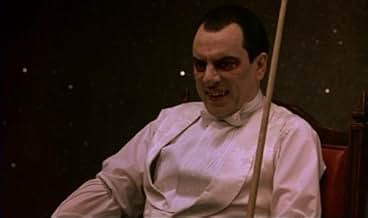Rhapsodie en 3 bandes
Titre original : Billy the Kid and the Green Baize Vampire
NOTE IMDb
5,6/10
369
MA NOTE
Ajouter une intrigue dans votre langueCocky snooker player Billy Kid faces six-time world champion Maxwell Randall in a grudge match with high stakes: the loser must retire from professional snooker forever.Cocky snooker player Billy Kid faces six-time world champion Maxwell Randall in a grudge match with high stakes: the loser must retire from professional snooker forever.Cocky snooker player Billy Kid faces six-time world champion Maxwell Randall in a grudge match with high stakes: the loser must retire from professional snooker forever.
Danny Webb
- TV Director
- (as Daniel Webb)
Avis à la une
As a long time snooker fan I'd heard whispers about this film for years and it was only recently after months of searching that I finally managed to get hold of a copy. It's true that only Channel 4 in its early days could throw up something as bizarre as Billy the Kid and The Green Baize Vampire. By the same token snooker was the most popular sport in Britain in the mid-80's so making a film about it and its rivalries (players, managers, fans and everything that they stood for) was perhaps less of a risk then compared to how it might now seem.
As sports films go it's not bad but neither is it great. Perhaps the most unfortunate thing about the film is that the real snooker world was throwing up its own unparalleled sporting drama at the time, be it the black ball finish in the 1985 World Championship between Dennis Taylor and Steve Davis or, more to the point, the riveting rivalry between Davis and Alex Higgins who really were like chalk and cheese. One had a squeaky-clean image, the other was a lovable rogue with a penchant for vices and they both hated each other's guts. The rivalry between Maxwell and Billy or indeed the players they are based on (Dracula look-alike Ray Reardon and new kid on the block Jimmy White) could never evoke the same passions and even then Phil Daniels and Alun Armstrong, talented as they are, are slightly unconvincing here. Like most young upstarts Daniels (resembling Dexy's Kevin Rowland more than Jimmy White) reels off a few cocky taunts but he's far from the booze fuelled, authority-hating and downright rude figure that Higgins was. The whole thing feels like little more than your token pre-match jibing session and it's not helped by the fact that the humour is laboured as well. Granted, the idea of both players having completely different sets of followers and standing for completely different ideals and generations is well handled but even then a far better illustration of this would be to witness the audience reaction when Higgins and Davis crossed cues in front of 3,000 people in the 1985 Masters at the Wembley Conference Centre.
In saying all this I think it's important to appreciate how difficult an obscure project like this must have been to tackle and those who did so obviously weren't afraid of trying something different. Furthermore even though this film ends up being something of a failure it does nevertheless contain enough flashes of brilliance to convince you that there is a really unique talent behind it all and one that has done or probably could do a lot better. Despite being entirely studio bound and having a limited budget, the whole thing is shot with real class and looks wonderfully expensive. I love the dimly lit snooker halls, Maxwell's creepy pad really brings those fantasy images of Reardon to life, there are a few memorable quotes and the costume department do a good job here too. It's also worth noting that there is none of that dodgy editing, typical of sports movies, whereby a player hits a ball a mile away from the pocket and yet it miraculously manages to reach its intended target. As for the music, well, it's a little bit uninspired and at times feels like it's fleshing out a script lacking in ideas but the film does open with an excellent jaunty sax sore, evoking shades of Francis Monkman's score for The Long Good Friday, and Billy launches his comeback near the end to the strains of a catchy little piece called 'The Fame Game'. Alan Clarke was, of course, the man behind it all and while this is ultimately one of his less memorable moments it was nonetheless an interesting little venture/ indulgence.
As sports films go it's not bad but neither is it great. Perhaps the most unfortunate thing about the film is that the real snooker world was throwing up its own unparalleled sporting drama at the time, be it the black ball finish in the 1985 World Championship between Dennis Taylor and Steve Davis or, more to the point, the riveting rivalry between Davis and Alex Higgins who really were like chalk and cheese. One had a squeaky-clean image, the other was a lovable rogue with a penchant for vices and they both hated each other's guts. The rivalry between Maxwell and Billy or indeed the players they are based on (Dracula look-alike Ray Reardon and new kid on the block Jimmy White) could never evoke the same passions and even then Phil Daniels and Alun Armstrong, talented as they are, are slightly unconvincing here. Like most young upstarts Daniels (resembling Dexy's Kevin Rowland more than Jimmy White) reels off a few cocky taunts but he's far from the booze fuelled, authority-hating and downright rude figure that Higgins was. The whole thing feels like little more than your token pre-match jibing session and it's not helped by the fact that the humour is laboured as well. Granted, the idea of both players having completely different sets of followers and standing for completely different ideals and generations is well handled but even then a far better illustration of this would be to witness the audience reaction when Higgins and Davis crossed cues in front of 3,000 people in the 1985 Masters at the Wembley Conference Centre.
In saying all this I think it's important to appreciate how difficult an obscure project like this must have been to tackle and those who did so obviously weren't afraid of trying something different. Furthermore even though this film ends up being something of a failure it does nevertheless contain enough flashes of brilliance to convince you that there is a really unique talent behind it all and one that has done or probably could do a lot better. Despite being entirely studio bound and having a limited budget, the whole thing is shot with real class and looks wonderfully expensive. I love the dimly lit snooker halls, Maxwell's creepy pad really brings those fantasy images of Reardon to life, there are a few memorable quotes and the costume department do a good job here too. It's also worth noting that there is none of that dodgy editing, typical of sports movies, whereby a player hits a ball a mile away from the pocket and yet it miraculously manages to reach its intended target. As for the music, well, it's a little bit uninspired and at times feels like it's fleshing out a script lacking in ideas but the film does open with an excellent jaunty sax sore, evoking shades of Francis Monkman's score for The Long Good Friday, and Billy launches his comeback near the end to the strains of a catchy little piece called 'The Fame Game'. Alan Clarke was, of course, the man behind it all and while this is ultimately one of his less memorable moments it was nonetheless an interesting little venture/ indulgence.
I've been wanting to see this movie for years, and just caught a very rare screening at the National Film Theatre. There were maybe twenty people there, and if there was any justice the place would have been standing-room only. Whatever about that, those of us who made it had a good time. This is one of the strangest and most entertaining British films, certainly of the Eighties, and probably of the entire twentieth century. You may be reminded of other movies (I thought of Ken Russell's wild set designs, and also Eraserhead) but there really is nothing to compare it to... The performances are broad, cartoonish even, but well-judged. They never topple over into self-parody. Phil Daniels is as good as ever, but I was especially impressed by Bruce Payne (a new name to me) who does a great job with the least defined role in the movie, 'T.O.', Billy's manager, the weak link in the chain, the craven gambling addict whose need puts Billy in danger of losing his career (but whose eye for the main chance is the reason he has a career at all...) The songs are kind of a mixed bag, bit when they're good (as they are through all of the outlandishly gripping final snooker game) they're much better than 'Tommy', for instance, and Phil Daniel's final stream-of-consciousness number, foreseeing his bright but banal future, wouldn't sound out of place on a Blur CD.... It looks unlikely that this is ever going to come out on video let alone DVD, but if any freakish chance allows you the opportunity to see it, then do. You won't be bored. Bewildered maybe, confused perhaps, laughing like a drain hopefully. But definitely not bored.
I've never gone back to comment on a film for a second time before. However, having finally managed to see BTK & the GBV on the big screen (never in a million years did I think I'd get that opportunity) I just had to say a few more words.
I long ago lost count of how often I've seen this film but I was amazed at how much detail is lost when viewing it on a TV screen. Not only can so much more of the background be seen but the actors' expressions are so much clearer, which means the whole event is that much more enjoyable. I also found that the clever and sometimes intricate editing was much more noticable on a larger screen. I didn't mention him in my first review but Stephen Singleton did a brilliant job as editor and it's not surprising to find that he's been such a fixture in the work of various members of the production team.
When the National Film Theatre announced that they were doing a 'Focus on Alan Clarke' season, I didn't think for one moment that his most obscure movie would be included in the line-up. As one of the twenty or so people in that cinema, I sat there with a big grin on my face from beginning to end. I just couldn't believe my luck.
This really is surreal film making at its very best and a fine testimony to the brilliance of the late Alan Clarke.
I long ago lost count of how often I've seen this film but I was amazed at how much detail is lost when viewing it on a TV screen. Not only can so much more of the background be seen but the actors' expressions are so much clearer, which means the whole event is that much more enjoyable. I also found that the clever and sometimes intricate editing was much more noticable on a larger screen. I didn't mention him in my first review but Stephen Singleton did a brilliant job as editor and it's not surprising to find that he's been such a fixture in the work of various members of the production team.
When the National Film Theatre announced that they were doing a 'Focus on Alan Clarke' season, I didn't think for one moment that his most obscure movie would be included in the line-up. As one of the twenty or so people in that cinema, I sat there with a big grin on my face from beginning to end. I just couldn't believe my luck.
This really is surreal film making at its very best and a fine testimony to the brilliance of the late Alan Clarke.
I've got to be honest, but I've not seen this film for a good few years. However the first time I saw it ( on a new-ish Channel 4 and about the time it was very fashionable to be able to run a list of the top snooker players of the time as well as know the juicy bits of gossip behind each name) it bewildered and amazed. Bewildered in the sense that someone had made a Musical about Snooker and Amazed that it blimmin well worked so cool and despite not seeing it for so long I can't watch Jimmy White without seeing Phil Daniels. Although the whole film is a blast I particularly remember the closing sequences of the tournament play-off itself specially the music track for the whole sequence (having played and rewound that umpteen times)(Yeah I recorded it, just wish I could find that tape). I was intrigued to know how many of the community knew about this gem and pleased to find that those who do liked it. Pity it`s not avaliable (yet) on VHS or DVD. Here's hoping.
10THFC
This is no ordinary musical. The plot is simple enough: Maxwell Randall (the Green Baize Vampire) is six times world snooker champion and Billy Kid is the cocky young upstart looking to steal his crown. Add to them T.O. (The One), Billy's wide boy manager, the Wednesday Man, to whom T.O. owes a large gambling debt, and Miss Sullivan, a trouble making journalist, and there you have it (apart from two sets of hangers on who make up the chorus). Basically, Maxwell wants to set up a grudge match (the loser will never play professional snooker again), the Wednesday Man tricks T.O. into accepting the challenge by assuring him that Maxwell will not be "at his best", and Billy finds that he has been set up to lose.
What makes this peculiar film work is the stark, to-the-point direction of Alan Clarke (responsible for such hard hitting productions as "Scum" and "The Firm") the rock/opera influenced music of the highly respected composer George Fenton ("The Madness of King George", "Cry Freedom", "Gandhi" etc.) and the clever scripting and original lyrics of Trevor Preston. Take into account three wonderfully tongue-in-cheek central performances from Phil Daniels (Billy), Alun Armstrong (Maxwell) and Bruce Payne (T.O.) and you have the ingredients for what I am quite happy to admit is my all time favourite film. There are those who may say that Clarke, Fenton, Daniels, Armstrong and Payne must have taken leave of their senses to agree to do such a downright weird project in the first place (I have a feeling that at least one of the above might even agree with those detractors) but I can't see anything wrong with a musical about snooker that includes references to Bela Lugosi and arcade games, has characters tangoing about and shooting snooker balls into pockets with the help of a revolver and basically, sends itself up with obvious glee.
I'd be the first to admit that the three lead actors have all done a great deal more admirable work than this. I've seen Alun Armstrong in countless stage productions and he never fails to impress. Bruce Payne was nothing short of breathtaking in Steven Berkoff's "Greek" and Phil Daniels as Alex in the RSC's "A Clockwork Orange" is still one of the most outstanding performances I've ever seen from any actor, on any stage, anywhere. However, I will always remain particularly fond of the off-the-wall characters that the three brought to life in this wonderful film and I don't care what anyone else says, I think it's just great.
If you haven't already seen "Billy the Kid & the Green Baize Vampire" you'll be extremely lucky if you ever do. It was first shown on UK television in the mid-eighties and has, I think, been repeated just once. Zenith Productions sold the rights (or whatever it is they do) some time ago and, search as I may, I've been unable to locate it. I'm just grateful that I had the forethought to tape it when Channel Four showed it all those years ago and only hope that my VCR never gets hungry and chews it up!
My enthusiasm for this film probably does no more than give it a one woman cult following but if there are any more odd little "BTK..." fans out there, please add your comments; it'd be comforting to know that I'm not alone.
What makes this peculiar film work is the stark, to-the-point direction of Alan Clarke (responsible for such hard hitting productions as "Scum" and "The Firm") the rock/opera influenced music of the highly respected composer George Fenton ("The Madness of King George", "Cry Freedom", "Gandhi" etc.) and the clever scripting and original lyrics of Trevor Preston. Take into account three wonderfully tongue-in-cheek central performances from Phil Daniels (Billy), Alun Armstrong (Maxwell) and Bruce Payne (T.O.) and you have the ingredients for what I am quite happy to admit is my all time favourite film. There are those who may say that Clarke, Fenton, Daniels, Armstrong and Payne must have taken leave of their senses to agree to do such a downright weird project in the first place (I have a feeling that at least one of the above might even agree with those detractors) but I can't see anything wrong with a musical about snooker that includes references to Bela Lugosi and arcade games, has characters tangoing about and shooting snooker balls into pockets with the help of a revolver and basically, sends itself up with obvious glee.
I'd be the first to admit that the three lead actors have all done a great deal more admirable work than this. I've seen Alun Armstrong in countless stage productions and he never fails to impress. Bruce Payne was nothing short of breathtaking in Steven Berkoff's "Greek" and Phil Daniels as Alex in the RSC's "A Clockwork Orange" is still one of the most outstanding performances I've ever seen from any actor, on any stage, anywhere. However, I will always remain particularly fond of the off-the-wall characters that the three brought to life in this wonderful film and I don't care what anyone else says, I think it's just great.
If you haven't already seen "Billy the Kid & the Green Baize Vampire" you'll be extremely lucky if you ever do. It was first shown on UK television in the mid-eighties and has, I think, been repeated just once. Zenith Productions sold the rights (or whatever it is they do) some time ago and, search as I may, I've been unable to locate it. I'm just grateful that I had the forethought to tape it when Channel Four showed it all those years ago and only hope that my VCR never gets hungry and chews it up!
My enthusiasm for this film probably does no more than give it a one woman cult following but if there are any more odd little "BTK..." fans out there, please add your comments; it'd be comforting to know that I'm not alone.
Le saviez-vous
- AnecdotesThe characters Billy the Kid and Maxwell Randall, aka the Green Baize Vampire, are inspired by real-life snooker players Jimmy White and Ray Reardon, aka Dracula, respectively.
- ConnexionsReferenced in Home Nations Series: 2016 Northern Ireland Open: Day 5, Part 1 (2016)
Meilleurs choix
Connectez-vous pour évaluer et suivre la liste de favoris afin de recevoir des recommandations personnalisées
- How long is Billy the Kid and the Green Baize Vampire?Alimenté par Alexa
Détails
- Date de sortie
- Pays d’origine
- Langue
- Aussi connu sous le nom de
- Billy the Kid and the Green Baize Vampire
- Lieux de tournage
- Sociétés de production
- Voir plus de crédits d'entreprise sur IMDbPro
Contribuer à cette page
Suggérer une modification ou ajouter du contenu manquant

Lacune principale
By what name was Rhapsodie en 3 bandes (1985) officially released in Canada in English?
Répondre




























